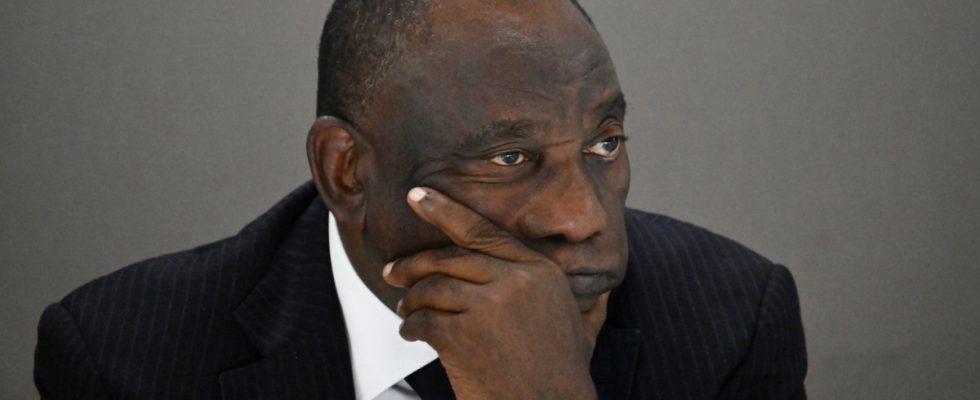Where does South Africa stand in the world? And above all: on whose side? Two days before the start of the Brics Summit in Johannesburg, Cyril Ramaphosa saw the time on Sunday to dig deep into this complicated issue. At eight o’clock in the evening, at prime time, South Africa’s President made a government statement on foreign policy, which was broadcast on state television in its entirety of 30 minutes. It can be summed up in a sentence by Ramaphosa: “We will not allow ourselves to be drawn into a competition between world powers.”
The sentence sounded resolute and programmatic. And of course it goes well with the upcoming summit, which is supposed to focus on relations between the Brics countries and Africa. Not only will Ramaphosa receive the presidents of Brazil, India and China and the Russian foreign minister in Johannesburg, he has also invited more than 30 heads of state from Africa. “Inclusive multilateralism” is the motto.
Entangled in the competition of world powers
The problem is that the claim that South Africa cannot be drawn into a competition between world powers is not entirely accurate. In fact, that’s what happened a long time ago. At least knee-deep and very willingly, Ramaphosa has allowed himself to be drawn into a great power conflict. And his Brics opening speech is another step in trying to wriggle back out.
In theory, Ramaphosa’s foreign policy doctrine, which he also laid out in Sunday’s speech, ties in with the non-aligned movement of the Cold War era: We are not tied to any power, neither the United States, nor China, nor Russia. We want to cooperate with everyone. In practice, after the Russian attack on Ukraine, South Africa did the opposite. The country steered a pro-Moscow course that culminated in joint military maneuvers off South Africa’s coast on the anniversary of Russia’s invasion, greatly angering the US.
Why Ramaphosa aligned himself so closely with Putin is not easy to answer. South Africa’s governing party, the ANC, has historically had close ties to Moscow and is still grateful for the Soviet Union’s help in the fight against apartheid. However, unlike his predecessor Jacob Zuma, the president himself has never attracted attention as a Russia fan. At the beginning of his tenure, he increasingly turned his attention to the USA and Europe, a typical pendulum movement of the internationally notorious “swing state” South Africa. Possibly Ramaphosa is more driven by his party friends. His disappointment with the western countries, which did not show solidarity with Africa when it came to distributing the corona vaccines, may also play a role. “We felt like beggars,” he said later.
China now takes pride of place
But it is also clear that Russia – unlike the USA and Europe – is not an important trading partner for South Africa. Powerful business leaders in South Africa have been trying to remind Ramaphosa of this fact in recent months. The US also forced his government to carefully weigh the benefits and risks of friendship with Russia. In Washington, there was a threat that South Africa could lose privileged access to the US market under the African Growth and Opportunity Act (AGOA).
In the meantime, it’s impossible to overlook how South Africa is slowly emerging from the Russian embrace. In July, Ramaphosa led an African peacekeeping delegation that visited Kyiv and Moscow, in that order. He called on Putin to extend the grain agreement because Africa is particularly suffering from its end. Finally, he talked Russia’s president out of a visit to the Brics summit, which he was apparently very reluctant to give up. So reluctant that Moscow even threatened war if South Africa were to execute the arrest warrant issued against Putin in The Hague. This is what Ramaphosa reported afterwards personally.
“Strategic partnership”: Before the start of the summit, China’s President Xi Jinping will make a state visit to South Africa.
(Photo: Mikhail Tereshchenko /SPUTNIK/REUTERS)
Traces of this course correction can now also be found in his speech. Ramaphosa lists the most important export countries for South Africa: China, the USA, Germany, Japan and India. Russia is not on this list, but three countries belonging to the G7 are. Russia appears only once in Ramaphosa’s speech: when he calls for an end to the “conflict” with Ukraine and demands that all children taken from their families in Ukraine must return. As a reminder, the kidnapping of children is the allegation on which the arrest warrant of the International Criminal Court against Putin is based.
China takes pride of place in Ramaphosa’s speech. Its President Xi Jinping will pay a state visit to South Africa before the Brics summit on Tuesday. Ramaphosa announced several agreements the two countries would sign, citing the “strategic partnership” with China as one reason why his country deserves being a Brics member.
At the Johannesburg summit, Ramaphosa is likely to reciprocate by supporting a Chinese project: an expansion of the Brics group. “South Africa supports enlargement,” he said in his speech. That’s quite surprising, because as a lightweight among the Brics giants, South Africa has a lot to lose by adding new members – such as the exclusive link to Beijing so touted by Ramaphosa.
And there’s another reason why Brics expansion isn’t necessarily in South Africa’s interests: because China (and Russia) could turn the growing group of states into an anti-Western bulwark, thereby exacerbating the bloc formation that’s causing South Africa so much trouble right now. For this reason Brazil and India – like South Africa border crossers between the blocs – oppose enlargement. It cannot be ruled out that Ramaphosa will be drawn into the next competition between world powers.

